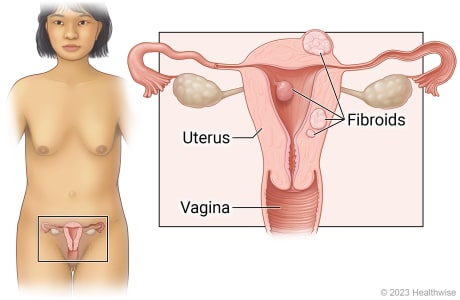
What is an abdominal myomectomy?
A myomectomy takes out fibroids from the uterus. Uterine fibroids are growths on the outer wall, on the inner wall, or inside the wall of the uterus. They are not cancer.
The surgery is done through a cut the doctor makes in your lower belly. The cut is also called an incision. In many cases, the doctor makes the cut just above the pubic hairline. In other cases, the cut runs from the belly button to the pubic hairline. Both cuts leave a scar. It often fades with time.
You may stay in the hospital for 1 to 4 days. You can expect to feel better each day. But you may need about 4 to 6 weeks to recover.
This surgery should decrease the pain and heavy bleeding that are caused by fibroids. You will still have your uterus. Having this done should not affect your ability to have children. Sometimes it is done to help fertility. But there is a chance that surgery could harm the uterus. This can cause problems with a future pregnancy. Talk to your doctor about this before your surgery.
How do you prepare for surgery?
Surgery can be stressful. This information will help you understand what you can expect. And it will help you safely prepare for surgery.
Preparing for surgery
- Be sure you have someone to take you home. Anesthesia and pain medicine will make it unsafe for you to drive or get home on your own.
- Understand exactly what surgery is planned, along with the risks, benefits, and other options.
- If you take a medicine that prevents blood clots, your doctor may tell you to stop taking it before your surgery. Or your doctor may tell you to keep taking it. (These medicines include aspirin and other blood thinners.) Make sure that you understand exactly what your doctor wants you to do.
- Tell your doctor ALL the medicines, vitamins, supplements, and herbal remedies you take. Some may increase the risk of problems during your surgery. Your doctor will tell you if you should stop taking any of them before the surgery and how soon to do it.
- Make sure your doctor and the hospital have a copy of your advance directive. If you don't have one, you may want to prepare one. It lets others know your health care wishes. It's a good thing to have before any type of surgery or procedure.
What happens on the day of surgery?
-
Follow the instructions exactly about when to stop eating and drinking. If you don't, your surgery may be canceled. If your doctor told you to take your medicines on the day of surgery, take them with only a sip of water.
-
Take a bath or shower before you come in for your surgery. Do not apply lotions, perfumes, deodorants, or nail polish.
-
Do not shave the surgical site yourself.
-
Take off all jewelry and piercings. And take out contact lenses, if you wear them.
At the hospital or surgery center
-
Bring a picture ID.
-
The area for surgery is often marked to make sure there are no errors.
-
You will be kept comfortable and safe by your anesthesia provider. The anesthesia may make you sleep. Or it may just numb the area being worked on.
-
The surgery will take about 2 hours.
When should you call your doctor?
- You have questions or concerns.
- You don't understand how to prepare for your surgery.
- You become ill before the surgery (such as fever, flu, or a cold).
- You need to reschedule or have changed your mind about having the surgery.
Where can you learn more?
Go to http://www.healthwise.net/patientEd
Enter N015 in the search box to learn more about "Abdominal Myomectomy: Before Your Surgery".
Current as of: April 30, 2024
Author: Ignite Healthwise, LLC Staff
Clinical Review Board
All Healthwise education is reviewed by a team that includes physicians, nurses, advanced practitioners, registered dieticians, and other healthcare professionals.

